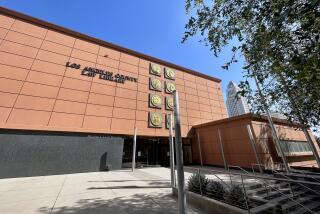School’s Clinic Helps Elderly Get Justice : Legal aid: Attorneys supervise students who handle about 1,000 cases annually. Issues range from wills and divorces to former miners’ black lung disability claims.
- Share via
CAIRO, Ill. — Since her husband died last year, 81-year-old Eva Childress has been subjected to a string of wrongs. A plumber left an all-night leak, the cemetery buried her spouse in the wrong grave and a dealership sold her the wrong car.
So Childress, living on Social Security and unable to afford an attorney, turned to Southern Illinois University’s legal clinic, where law students help hundreds of poor, elderly people get their day in court.
“You could go to 10 attorneys, and I bet nine of them wouldn’t take the cases we do,” said Mary Rudasill, a law professor and the program director.
Each semester, three attorneys at the clinic supervise up to 16 students who canvass 13 counties in Southern Illinois. They handle about 1,000 cases annually, ranging from wills and divorces to miners’ complicated black lung disability claims.
Legal teams visit senior citizens’ centers in each county at least once a month; they also drop by nursing homes and hospitals, if necessary. The service is free, although participants are responsible for paying their own court costs if they can.
The program doesn’t handle criminal cases, malpractice, personal injury lawsuits or similar cases, but it can refer clients to lawyers who do.
Student Kurt Wagner, who plans to graduate as a tax lawyer next spring, calls the experience invaluable.
“The real appeal is to actually learn the practical side of law,” said Wagner. “You get to interview real clients and draft legal documents. You normally don’t get to do that in the classroom.”
The variety of cases makes life interesting for future attorneys. For example, Wagner, who spent much of last semester helping people with black lung disease apply for health benefits, might get a chance soon to argue a case before a state appellate court.
Childress walked into the Alexander County senior citizens’ center one morning and said she needed help because she thought she had bought a car with six cylinders but instead wound up with a four-cylinder model. The dealer offered to exchange the car if Childress came up with more money, but she thought that was unfair.
“Funny things happen to me. I guess they just look at me and say I’m an old woman,” Childress said.
Her case is pending.
Reflecting on his experiences, Wagner said, “You do get emotionally involved. You want to help out. So many seniors are in difficult situations. Sometimes they even need protection from their own families.”
Rudasill said she hopes a stint in the clinic opens students’ eyes to how law can help the less fortunate.
“What we teach these students is that you can get a lot out of representing somebody who’s not able to pay,” she said.
More to Read
Sign up for Essential California
The most important California stories and recommendations in your inbox every morning.
You may occasionally receive promotional content from the Los Angeles Times.










